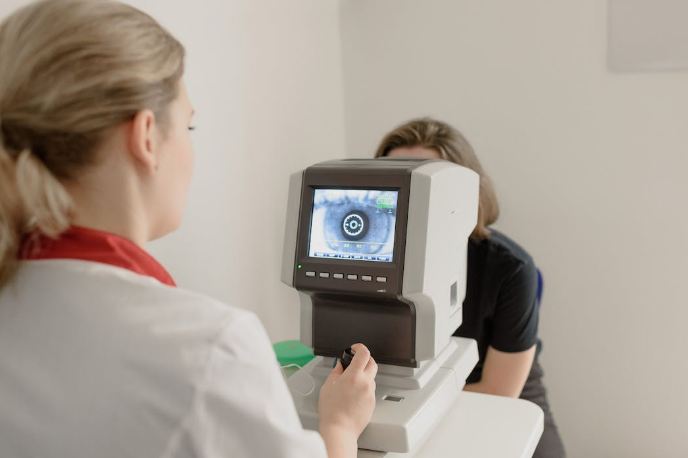Eye clinics play a crucial role in maintaining ocular health. They offer a range of services that cater to various needs, from basic vision testing to complex surgeries.
Understanding these services is essential for anyone seeking eye care. Here’s an overview of the types of services typically offered by eye clinics .
Routine Eye Exams
The cornerstone of any eye clinic, routine eye exams are essential for maintaining good vision and eye health. These exams can detect vision problems like nearsightedness, farsightedness, and astigmatism. They also help in identifying early signs of eye diseases such as glaucoma, cataracts, and macular degeneration.
In addition to identifying vision problems, routine eye exams are crucial for detecting silent eye diseases that show no early warning signs. These exams often involve a series of tests to assess eye health, including the examination of the retina and optic nerve, which can reveal systemic health issues like hypertension and diabetes.
Pediatric Eye Care
Children have unique vision needs. Pediatric eye care focuses on the visual development of infants, children, and adolescents. Eye clinics offer screenings for common childhood eye issues like lazy eye (amblyopia), crossed eyes (strabismus), and other developmental vision problems.
Pediatric eye care is essential for ensuring the healthy visual development of children. Eye clinics often engage in educational initiatives, teaching parents about the importance of early eye care, the signs of vision problems in children, and the need for regular eye screenings during the developmental years.
Contact Lens Fitting
For those preferring contact lenses over glasses, eye clinics provide contact lens fitting services. This includes measuring the eye’s surface and recommending the best type of contact lens based on the individual’s lifestyle, prescription, and eye health.
Beyond basic fitting, the service includes training on proper lens care and handling, especially for first-time users. The eye clinic also provides follow-up appointments to ensure the lenses are comfortable, effective, and not causing any harm to the eye.
Prescription Glasses
Most eye clinics have an optician on site who helps patients select and fit prescription glasses. This service includes a variety of frame styles and lens options, including bifocals, progressives, and lenses with special coatings.
This service often includes a personalized consultation to help choose the best frames and lenses based on lifestyle, occupation, and aesthetic preferences. Clinics may also offer advanced lens technologies like blue light filtering and adaptive lenses that adjust to different lighting conditions.
Treatment of Eye Conditions
Eye clinics treat various eye conditions like dry eye syndrome, infections (conjunctivitis), inflammations, and allergic reactions. Treatment may involve prescription eye drops, oral medications, or other therapies.
Treatment for eye conditions may also involve lifestyle recommendations or dietary changes. For chronic conditions, such as dry eye syndrome, clinics provide guidance on managing symptoms and improving overall eye comfort.
Ocular Emergencies
Eye clinics often provide immediate care for ocular emergencies such as eye injuries, sudden vision loss, or severe eye pain. These situations require prompt attention to prevent long-term damage.
Providing care during ocular emergencies, clinics are equipped with the necessary tools and expertise to handle a range of urgent issues. Prompt treatment can often be the key to preventing permanent vision loss in cases like chemical injuries or retinal detachments.
Surgical Procedures
Many eye clinics offer surgical procedures. This includes cataract surgery, LASIK (laser-assisted in situ keratomileusis) for vision correction, and glaucoma surgery. These procedures are typically done by specialized ophthalmologists.
Eye clinics offering surgical procedures are often at the forefront of using advanced technologies, such as laser and minimally invasive surgical techniques. These advancements contribute to quicker recovery times and improved outcomes for patients.
Management of Chronic Eye Diseases
For patients with chronic conditions like glaucoma, diabetic retinopathy, or macular degeneration, eye clinics provide ongoing management and treatment. This might include regular monitoring, medication management, and coordination with other healthcare providers.
In managing chronic eye diseases, clinics focus on holistic care, which might include collaborating with other healthcare professionals to address underlying health issues like diabetes or high blood pressure that can affect eye health.
Cosmetic Procedures
Some eye clinics offer cosmetic procedures, such as eyelid surgery (blepharoplasty) to improve the appearance of droopy eyelids, or Botox injections for aesthetic concerns around the eye area.
Cosmetic procedures at eye clinics are not just about enhancing appearance but also about improving functionality. Procedures like blepharoplasty can also help improve the field of vision in individuals with severely drooping eyelids.
Low Vision Services
For individuals with significant vision impairment that cannot be corrected with standard glasses, contact lenses, or surgery, eye clinics offer low vision services. These include specialized visual aids and rehabilitation services to help maximize their remaining vision.
Low vision services are tailored to each individual’s needs, encompassing a range of adaptive technologies like magnifying devices, specialized software, and training on how to use them effectively to maintain independence and quality of life.
Eye clinics are a vital resource for both preventive and corrective eye care. They offer a comprehensive range of services to address a wide variety of visual and ocular health needs. Regular visits to an eye clinic can help ensure good eye health and optimal vision throughout one’s life.
